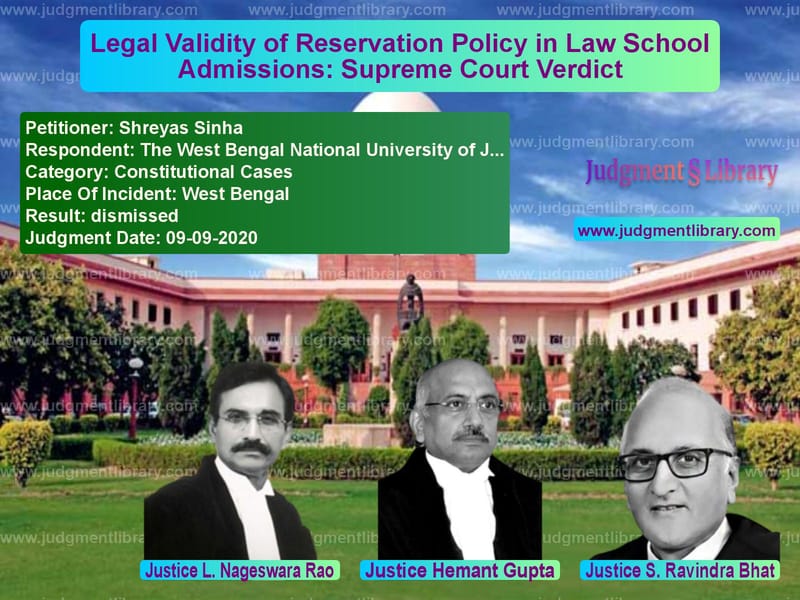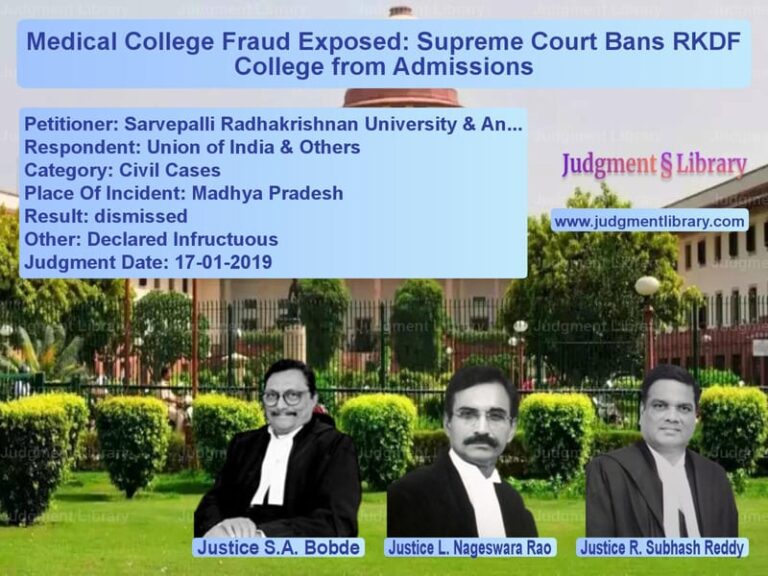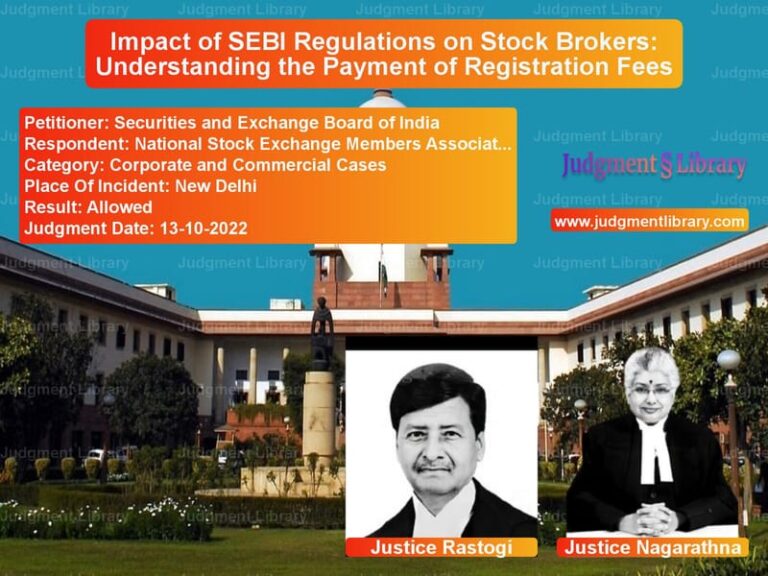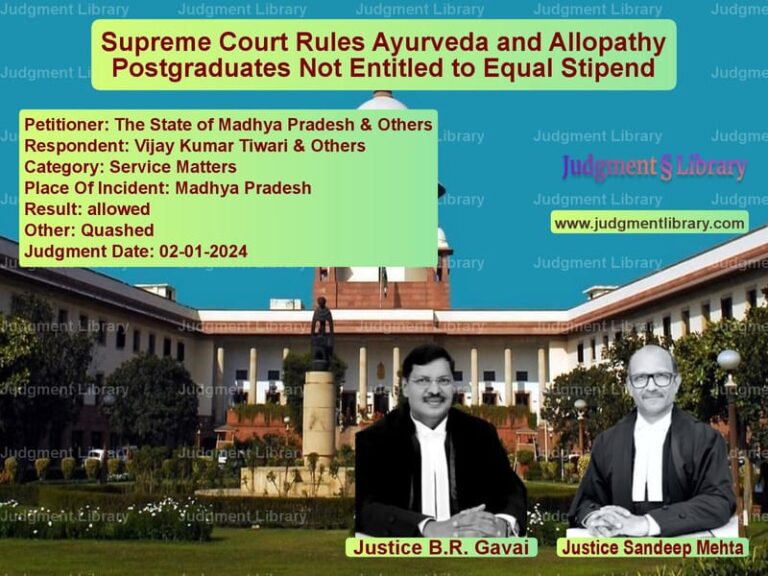Legal Validity of Reservation Policy in Law School Admissions: Supreme Court Verdict
The Supreme Court of India recently delivered a significant judgment in the case of Shreyas Sinha vs. The West Bengal National University of Juridical Sciences & Ors., which revolved around the implementation of a newly introduced reservation policy for domicile candidates in law school admissions. The key issue before the Court was whether the amendment to the West Bengal National University of Juridical Sciences Act, 1999, which mandated 30% reservation for state domicile students, could be applied retrospectively to an ongoing admission process.
This judgment addresses crucial legal questions regarding the timing of policy implementation, the rights of students under a merit-based admission system, and the principle of fairness in competitive examinations. The Supreme Court’s decision has far-reaching implications for education policies and reservation systems in India.
Background of the Case
The dispute arose when the West Bengal National University of Juridical Sciences (WBNUJS) amended its admission policy through an Amending Act that came into force on May 21, 2019. The amendment provided for the reservation of at least 30% of the total intake for students domiciled in West Bengal.
Prior to this amendment, admission to WBNUJS was conducted through the Common Law Admission Test (CLAT), which is a national-level entrance exam for law universities. The CLAT application process began on January 5, 2019, and the last date for submitting applications was March 31, 2019. The exam was initially scheduled for May 12, 2019, but was later conducted on May 26, 2019.
The appellant, Shreyas Sinha, participated in CLAT 2019 and secured an All-India Rank of 731. Based on merit, he was allotted a seat in the National Law University, Odisha. However, he chose not to accept the admission and instead sought admission to WBNUJS under the domicile reservation quota introduced by the Amending Act.
Since the reservation policy came into effect after the admission process had already begun, WBNUJS did not implement it for the academic session 2019-2020. The appellant challenged this decision before the Calcutta High Court, arguing that the amendment should apply immediately and he should be granted admission under the newly introduced quota.
Petitioner’s Arguments
The appellant, represented by senior advocate Mr. Vikas Singh, argued that:
- The Amending Act came into force on May 21, 2019, before CLAT was conducted on May 26, 2019.
- Since the reservation policy was already in effect, the university was bound to provide reserved seats for domicile candidates in the 2019-2020 academic session.
- The university’s refusal to grant him admission under the domicile quota was arbitrary and violated his right to equal opportunity.
- He was the only candidate seeking admission under the reserved category, and therefore, his request should be accommodated.
Respondent’s Arguments (WBNUJS)
WBNUJS, represented by senior counsel Mr. Chatterji, countered the appellant’s claims, stating that:
- The admission process for CLAT 2019 began in January, long before the Amending Act was passed.
- The university had to follow the admission process that was in place when applications were invited.
- All available seats, including those for West Bengal domicile candidates, had already been filled based on the CLAT merit list.
- Implementing the reservation policy immediately would have disrupted the admission process and unfairly displaced students who had already secured seats.
- The university’s Executive Council had resolved that the reservation policy would be implemented from the 2020-2021 academic session to ensure fairness.
High Court Judgment
The Calcutta High Court dismissed the appellant’s petition, holding that:
- The Amending Act was prospective and could not be applied retrospectively to an ongoing admission process.
- Implementing the new policy in the middle of the admission cycle would create administrative difficulties and unfairly alter the process for other candidates.
- The appellant had not qualified for admission under the general category, as the last admitted candidate in that category had a rank of 262, while the appellant’s rank was 731.
Supreme Court’s Ruling
The Supreme Court upheld the High Court’s decision, stating that:
- The principle of legal certainty required that rules governing admissions remain consistent throughout the admission process.
- The Amending Act did not specify that it should be applied to ongoing admissions, and therefore, the university’s decision to implement it from the next academic year was reasonable.
- Changing the reservation policy midway through the admission process would have unfairly impacted other students who had already secured admission based on existing rules.
- The appellant could not claim an automatic right to admission under the new policy since he did not meet the general category cutoff.
Conclusion and Impact
This Supreme Court judgment reinforces the principle that policy changes should not be applied retroactively unless explicitly stated. The ruling has significant implications for education policy, ensuring that:
- Admission rules remain consistent throughout the process to maintain fairness.
- Universities cannot introduce sudden policy changes that disadvantage students who have already secured admission.
- Reservation policies should be clearly implemented from a defined academic session to avoid legal challenges.
For students and educational institutions, this judgment provides clarity on the implementation of reservation policies and ensures a transparent and predictable admission process.
Petitioner Name: Shreyas Sinha.Respondent Name: The West Bengal National University of Juridical Sciences & Ors..Judgment By: Justice L. Nageswara Rao, Justice Hemant Gupta, Justice S. Ravindra Bhat.Place Of Incident: West Bengal.Judgment Date: 09-09-2020.
Don’t miss out on the full details! Download the complete judgment in PDF format below and gain valuable insights instantly!
Download Judgment: Shreyas Sinha vs The West Bengal Nati Supreme Court of India Judgment Dated 09-09-2020.pdf
Direct Downlaod Judgment: Direct downlaod this Judgment
See all petitions in Fundamental Rights
See all petitions in Constitution Interpretation
See all petitions in Public Interest Litigation
See all petitions in Legislative Powers
See all petitions in Education Related Cases
See all petitions in Judgment by L. Nageswara Rao
See all petitions in Judgment by Hemant Gupta
See all petitions in Judgment by S Ravindra Bhat
See all petitions in dismissed
See all petitions in supreme court of India judgments September 2020
See all petitions in 2020 judgments
See all posts in Constitutional Cases Category
See all allowed petitions in Constitutional Cases Category
See all Dismissed petitions in Constitutional Cases Category
See all partially allowed petitions in Constitutional Cases Category







